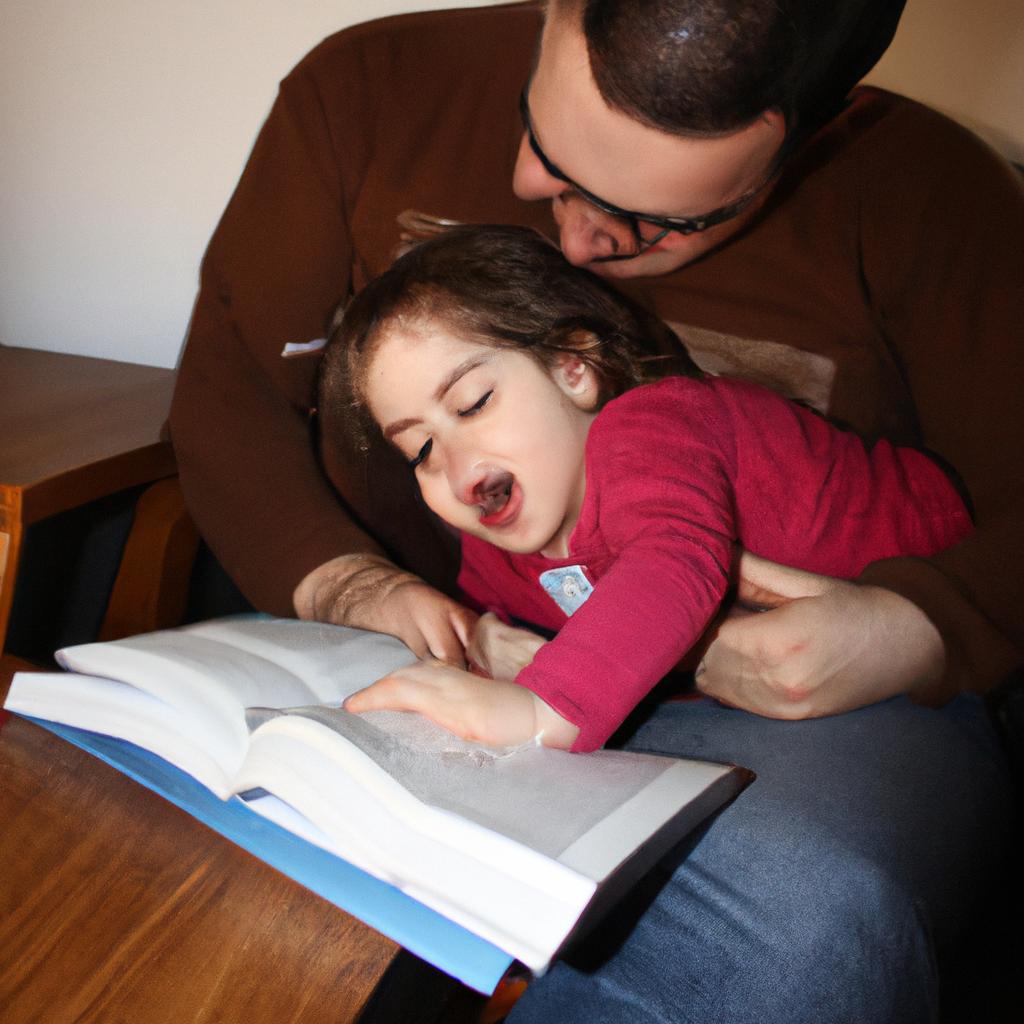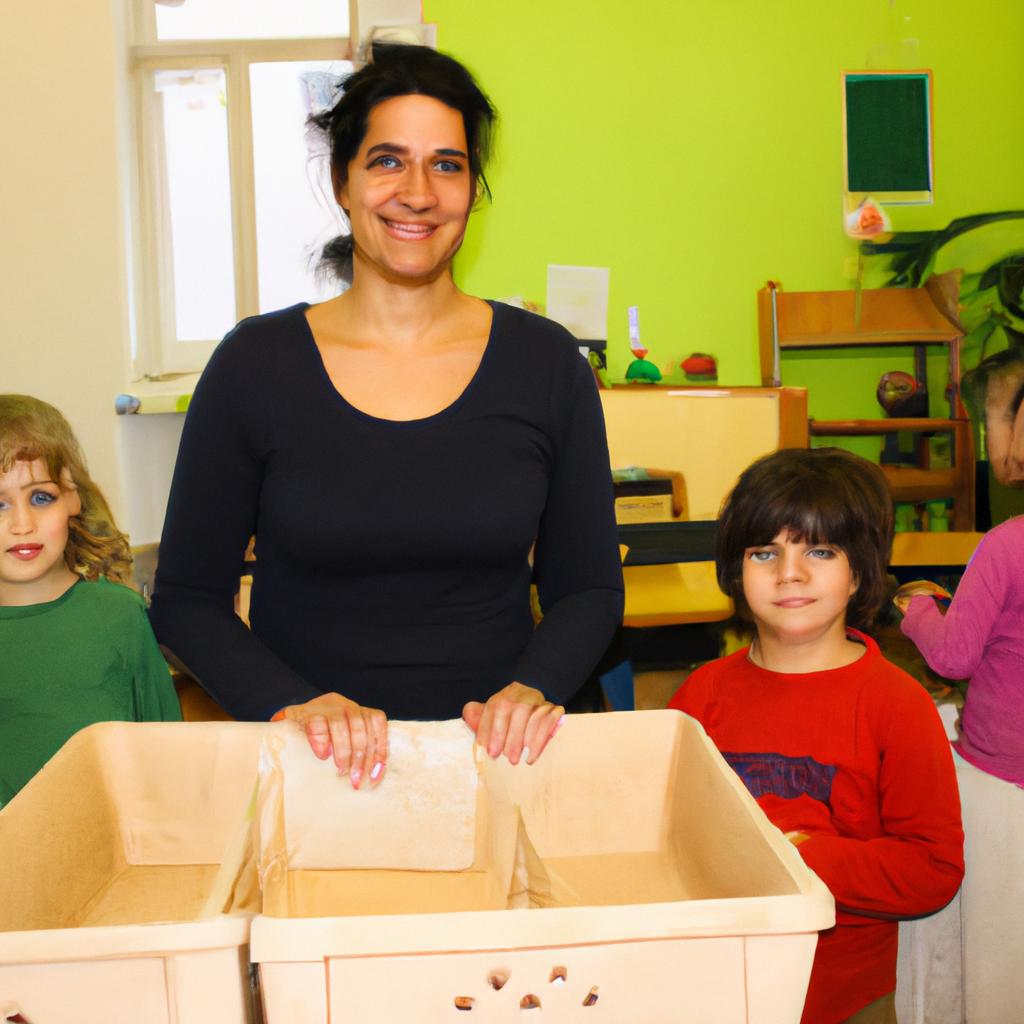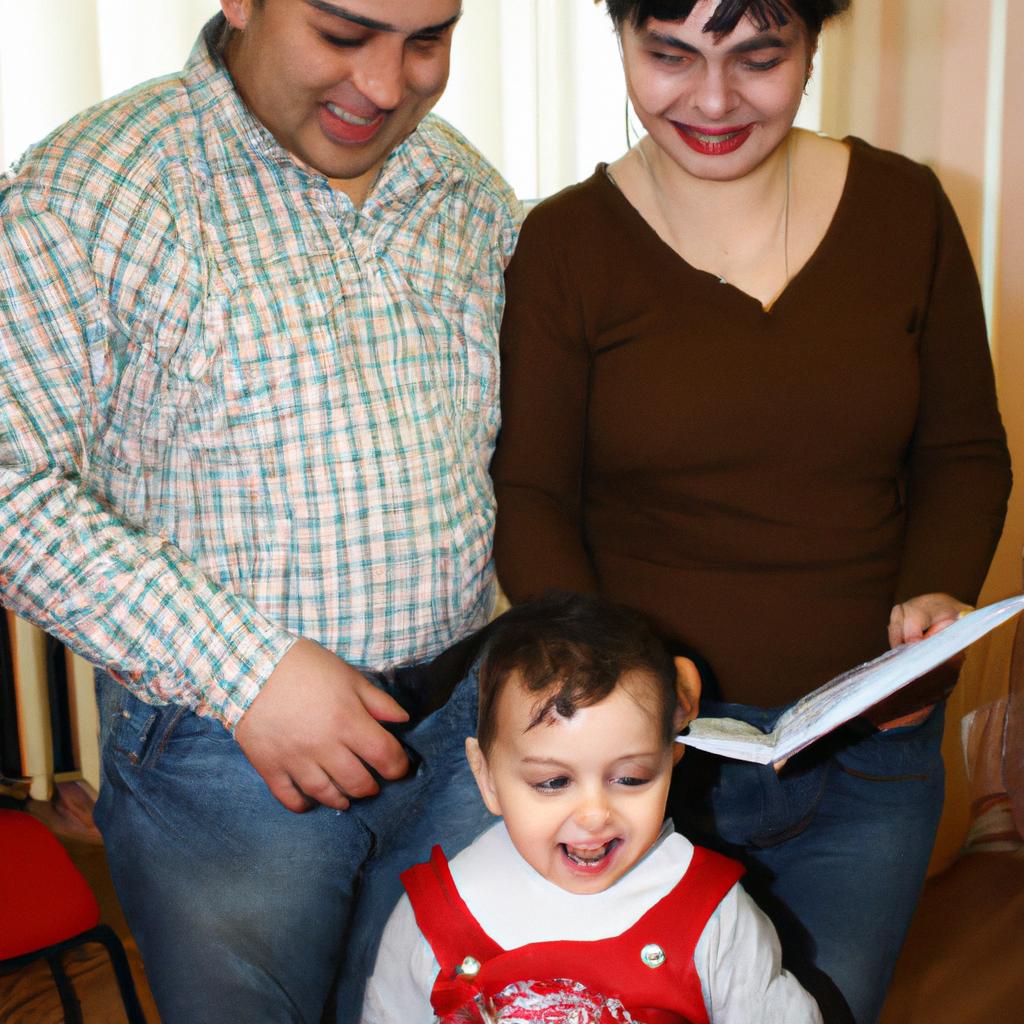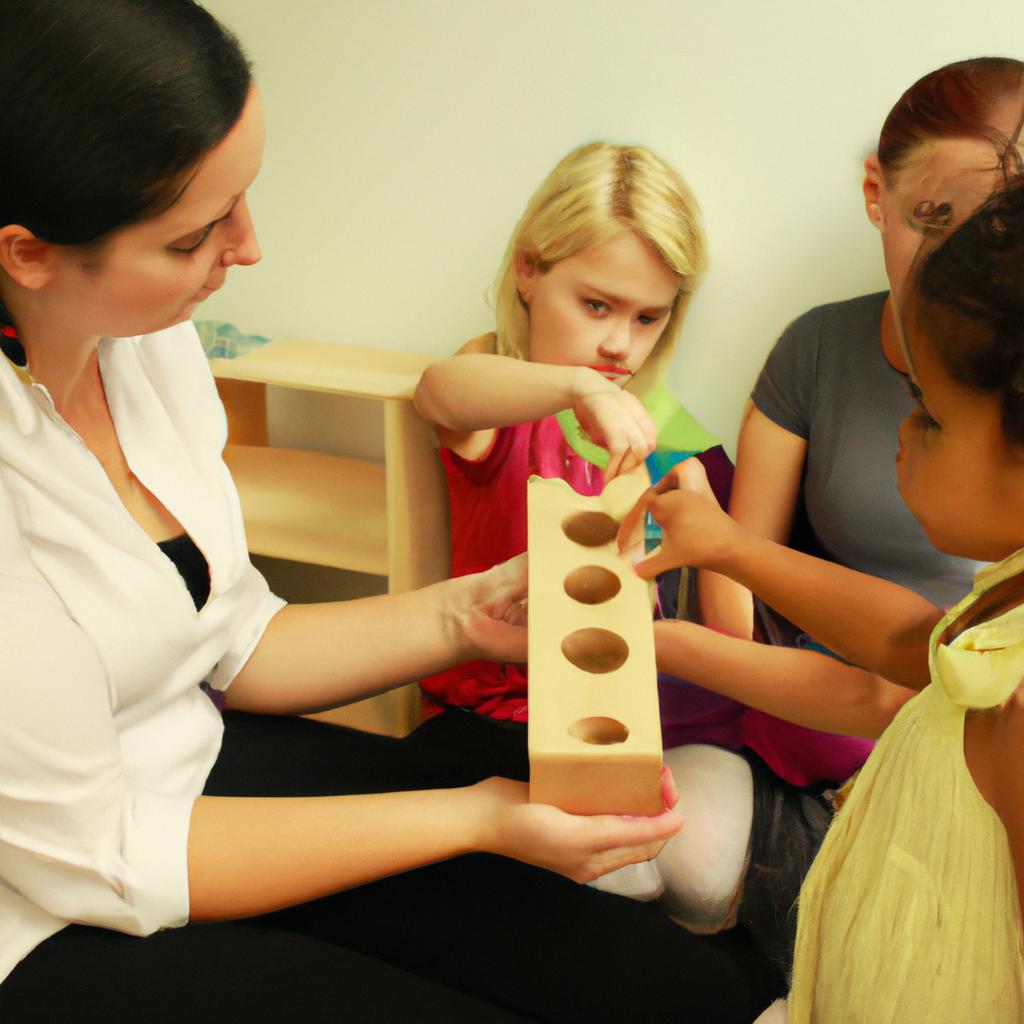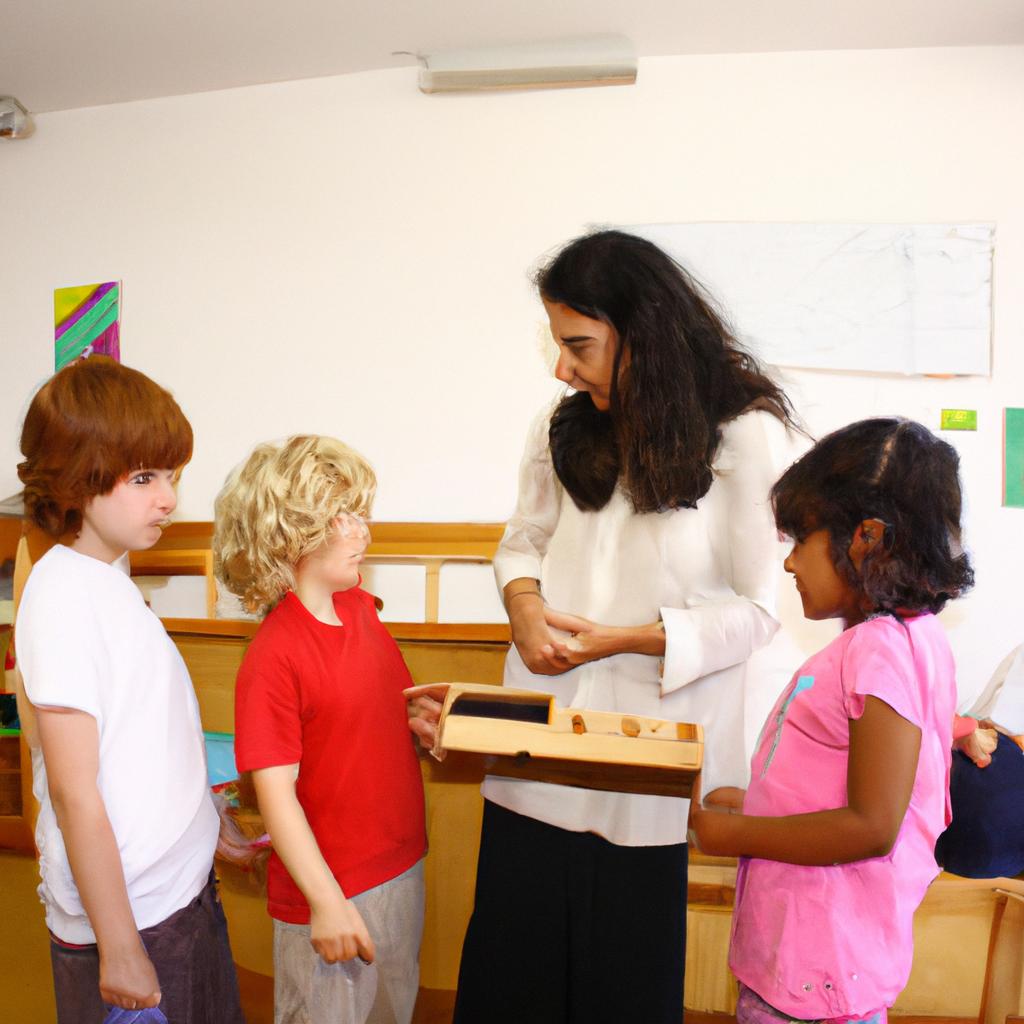In recent years, the Montessori approach to education has gained significant attention for its emphasis on child-centered learning and individualized instruction. Central to this educational philosophy is the active involvement of parents in their children’s education, forming a collaborative partnership between home and school. This article explores the benefits of parent involvement in Montessori education, highlighting how it empowers both students and parents alike.
Imagine a hypothetical case study where a child named Emma attends a Montessori school with highly involved parents. From an early age, Emma’s parents are actively engaged in understanding the principles and practices of Montessori education. They attend regular meetings with teachers and administrators to discuss Emma’s progress and receive guidance on how they can support her learning at home. As a result, Emma experiences seamless transitions between her classroom environment and her home life, fostering continuity in her educational journey. The close collaboration between Emma’s parents and her educators enables them to collectively identify areas of strength and areas that require further development, leading to tailored strategies that meet Emma’s unique needs.
Enhanced academic performance
One of the key benefits of parent involvement in Montessori education is the significant enhancement it brings to students’ academic performance. Studies have consistently shown that when parents actively engage in their children’s learning process, there is a marked improvement in their overall achievement and success.
To illustrate this point, let us consider a hypothetical scenario where a child named Emily attends a Montessori school with highly involved parents. In her early years, Emily’s parents regularly communicate with her teachers, attend parent-teacher conferences, and participate in workshops on effective parenting strategies. As a result of this collaborative effort between the school and her parents, Emily consistently demonstrates higher levels of engagement and motivation towards her studies compared to her peers from less-involved families. This increased motivation translates into improved academic outcomes for Emily across various subjects.
The positive impact of parent involvement on academic performance can be further understood through a bullet-point list:
- Increased student accountability: When parents are actively engaged in their child’s educational journey, students develop an enhanced sense of responsibility towards their studies.
- Improved study habits: Regular communication between parents and teachers allows for the identification of specific areas where students may need additional support or guidance. Consequently, appropriate interventions can be implemented to help improve study habits and ensure better academic progress.
- Stronger teacher-student relationships: Parent involvement fosters stronger connections between educators and learners by promoting open lines of communication. This enables teachers to gain valuable insights into individual student needs, tailoring instruction accordingly.
- Enhanced self-confidence: Through active participation in their child’s education, parents provide consistent encouragement and reinforcement which contributes positively to students’ self-esteem and confidence levels.
Additionally, incorporating a table like the one below helps visualize these points effectively:
| Benefits of Parent Involvement | Impact on Academic Performance |
|---|---|
| Increased student accountability | Higher levels of motivation |
| Improved study habits | Better academic progress |
| Stronger teacher-student relationships | Enhanced learning experience |
| Enhanced self-confidence | Improved academic outcomes |
In conclusion, parent involvement in Montessori education undoubtedly plays a crucial role in enhancing students’ academic performance. When parents actively participate in their child’s educational journey through effective communication and collaboration with teachers, it fosters an environment that is conducive to optimal learning. In the subsequent section on “Development of life skills,” we will explore how parent involvement further contributes to holistic growth beyond academics.
Development of life skills
Building upon the enhanced academic performance that parent involvement in Montessori education can bring, another significant benefit is the development of life skills. By actively engaging in their child’s educational journey, parents play a pivotal role in fostering essential qualities and abilities that extend beyond traditional academics.
Paragraph 1:
For instance, imagine a hypothetical case where a parent actively participates in their child’s Montessori experience by regularly attending parent-teacher conferences and collaborating with educators to tailor learning activities. This level of involvement creates an environment conducive to developing crucial life skills such as problem-solving, critical thinking, and decision-making. Working together with teachers allows parents to understand their child’s strengths and areas for improvement, enabling them to provide targeted support at home. As a result, children learn how to tackle challenges independently while also seeking guidance when needed—an invaluable skill set that will serve them well throughout their lives.
- Emotional response bullet point list:
- Increased self-confidence
- Enhanced communication skills
- Improved time management abilities
- Strengthened sense of responsibility
Paragraph 2:
To further illustrate the advantages of parental collaboration within the Montessori framework, consider the following table showcasing specific life skills nurtured through active engagement:
| Life Skills Developed | Examples |
|---|---|
| Problem-solving | Identifying alternative solutions; Analyzing complex situations |
| Critical thinking | Evaluating information objectively; Formulating reasoned arguments |
| Decision-making | Weighing pros and cons; Considering long-term consequences |
| Collaboration | Working effectively in groups; Respecting diverse perspectives |
Through this collaborative effort between parents and teachers, these essential life skills become ingrained within children from an early age, setting them up for future success both academically and personally.
Paragraph 3:
In addition to enhancing academic performance and fostering important life skills, parent involvement in Montessori education lays the foundation for building a strong parent-teacher relationship. By actively participating in their child’s education, parents establish a sense of trust and mutual respect with educators, creating an open line of communication that benefits the entire learning community. This collaborative partnership facilitates ongoing dialogue, enabling teachers to gain valuable insights into each child’s individual needs while ensuring parents remain informed and engaged throughout their educational journey.
As we explore the significance of building a strong parent-teacher relationship within Montessori education, it becomes evident that this collaboration is vital for unlocking each child’s full potential.
Building a strong parent-teacher relationship
The Benefits of Parent Involvement in Montessori: Empowering Education through Collaboration
…
As mentioned earlier, parent involvement plays a crucial role in supporting the development of life skills in children within the Montessori environment. Let’s consider an example to illustrate this point further. Imagine a child named Emily who is struggling with self-regulation and emotional management. Through regular collaboration between parents and teachers, they identify these areas as key focus points for Emily’s growth.
To truly understand the impact of parent involvement on developing life skills, let us delve into some specific benefits:
- Enhanced communication skills: When parents actively participate in their child’s education, it provides ample opportunities for meaningful conversations about various topics, fostering improved language proficiency and effective communication.
- Increased motivation and engagement: When parents show interest and engage in their child’s learning journey, it instills a sense of importance and value towards education. This leads to enhanced motivation, active participation in classroom activities, and overall academic success.
- Strengthened social-emotional well-being: Collaborative efforts between parents and educators create an environment that supports the social-emotional development of children. By addressing challenges like empathy-building or conflict resolution together, children gain valuable tools to navigate relationships effectively.
- Improved problem-solving abilities: Parent involvement encourages critical thinking and problem-solving by engaging children in discussions beyond traditional academics. Parents can provide real-life scenarios or involve them in decision-making processes at home, which transfers into increased problem-solving abilities in various situations.
These benefits are not mere conjectures; research consistently shows that when parents actively participate in their child’s education, there is a positive impact on academic achievement, cognitive development, behavior regulation, and overall well-being (see Table 1).
Table 1: Impact of Parent Involvement on Various Aspects
| Aspect | Research Findings |
|---|---|
| Academic Achievement | Higher grades across subjects |
| Cognitive Development | Improved problem-solving and critical thinking skills |
| Behavior Regulation | Reduced behavioral issues and improved self-regulation |
| Overall Well-being | Enhanced social-emotional development and increased self-esteem |
In light of these findings, it becomes evident that parent involvement is an essential component in empowering education within the Montessori framework. By actively participating in their child’s learning journey, parents contribute to the holistic development of life skills.
Transitioning into our next section, another significant benefit of parent involvement lies in its ability to promote a sense of belonging among children within the Montessori community.
Promoting a sense of belonging
Building a strong parent-teacher relationship is just the first step in empowering education through collaboration. By promoting a sense of belonging, Montessori schools further enhance the benefits of parent involvement. This section will explore how creating an inclusive environment for both parents and students can positively impact the educational experience.
To illustrate this point, let’s consider the example of Sarah, a new student at a Montessori school. On her first day, she feels nervous and unsure about fitting in. However, with the active involvement of her parents and teachers in fostering a sense of belonging, Sarah quickly adjusts to her new surroundings. She begins to form connections with fellow students and develops confidence in herself as a valued member of the community.
Promoting a sense of belonging within a Montessori setting involves several key aspects:
- Open communication channels: Regular updates from teachers keep parents informed about their child’s progress, ensuring they feel connected to their child’s learning journey.
- Parent participation opportunities: Encouraging parents to contribute actively in classroom activities or events fosters a deeper understanding of their child’s educational experiences.
- Celebration of diversity: Embracing cultural differences and incorporating diverse perspectives into the curriculum helps create an inclusive atmosphere where everyone feels welcome.
- Collaborative decision-making: Involving parents in important decisions related to their child’s education empowers them as partners in shaping their child’s learning experience.
A table displaying these four elements visually reinforces the significance of each aspect:
| Promoting Sense of Belonging |
|---|
| Open Communication Channels |
| Parent Participation Opportunities |
| Celebration of Diversity |
| Collaborative Decision-Making |
By prioritizing these elements, Montessori schools ensure that every stakeholder has a role in nurturing an environment where children feel supported and accepted. This collaborative approach not only enhances academic growth but also promotes emotional well-being among students.
Transitioning into our next section on fostering independence and self-confidence, we can see how a sense of belonging lays the foundation for children to explore their abilities and take ownership of their learning journey.
Fostering independence and self-confidence
Promoting a sense of belonging in the Montessori classroom is just one of the many benefits that parent involvement brings. When parents actively participate in their child’s education, it creates an atmosphere where children feel valued and connected to both home and school. This sense of belonging enhances their overall learning experience.
For instance, imagine a scenario where a child named Emily has her mother come into the Montessori classroom to read a story during circle time. As Emily sees her mother engage with her classmates and share in the learning environment, she feels a deep sense of pride and belonging. This positive interaction not only strengthens Emily’s bond with her mother but also fosters meaningful relationships with her peers.
In addition to promoting a sense of belonging, parent involvement in the Montessori approach helps foster independence and self-confidence among students. By actively engaging in their child’s education, parents provide support and guidance while encouraging them to take ownership of their learning journey. This collaboration between parents and educators empowers children to become independent thinkers who are confident in exploring new ideas and taking on challenges.
- Increased self-esteem: Children gain confidence when they see that their parents value their education.
- Improved problem-solving skills: Parent involvement allows for open discussions about problem-solving strategies at home.
- Enhanced communication: Regular interactions between parents and educators promote effective communication channels.
- Strengthened family bonds: Collaborative efforts in education create stronger connections within families.
Moreover, incorporating parental involvement through methods such as regular progress meetings or workshops can be represented using a three-column table format:
| Methods | Benefits |
|---|---|
| Regular progress meetings | – Parents stay informed about their child’s academic progress.- Teachers gain valuable insights about each student’s individual needs |
| Workshops for parents on Montessori principles | – Parents develop a deeper understanding of the educational approach- They learn how to implement Montessori principles at home |
| Classroom observation opportunities for parents | – Parents gain firsthand knowledge of their child’s learning environment- Teachers benefit from parental observations and feedback |
In conclusion, parent involvement in the Montessori approach has numerous benefits. It promotes a sense of belonging, fosters independence and self-confidence among students, strengthens family bonds, improves communication channels, and enhances problem-solving skills. By actively engaging with their child’s education, parents not only contribute to their academic success but also create a supportive learning environment that nurtures their overall development.
Creating a supportive learning environment
Building on the foundation of fostering independence and self-confidence, a supportive learning environment plays a crucial role in Montessori education. By creating an atmosphere where parents actively participate in their child’s educational journey, students benefit from increased motivation, enhanced social skills, and improved academic performance.
Case Study Example: Imagine a five-year-old student named Emily who is attending a Montessori school with high parent involvement. In this environment, her parents are encouraged to collaborate with teachers and administrators to create a nurturing space for her growth. This collaboration fosters numerous benefits that contribute to Emily’s overall development.
Firstly, when parents are involved in the learning process, it instills a sense of motivation in children like Emily. They see firsthand how much their parents value education and become inspired by their enthusiasm. Moreover, parental engagement provides additional support at home, leading to more effective reinforcement of concepts taught in the classroom. As a result, children feel empowered and motivated to explore new ideas independently.
Secondly, active parent involvement helps develop crucial social skills in students. Through regular communication between parents and teachers, as well as participation in events such as parent-teacher conferences or volunteer opportunities within the school community, children like Emily have ample opportunities for positive social interactions. These experiences promote empathy, cooperation, and teamwork – essential qualities that prepare them for future success both academically and socially.
Thirdly, research has consistently shown that parent involvement positively impacts academic achievement. When families engage with their child’s education through activities such as reading together at home or attending workshops offered by the school, they provide vital support that enhances learning outcomes. Furthermore, involving parents allows educators to gain valuable insights into each student’s unique needs and interests enabling tailored instruction that maximizes potential.
To further emphasize the significance of parent involvement in Montessori education:
Importance of Parent Involvement
- Enhances motivation
- Develops social skills
- Improves academic achievement
- Fosters a sense of community
| Benefits of Parent Involvement in Montessori Education |
|---|
| Enhanced motivation |
| Sense of belonging and support |
In conclusion, creating a supportive learning environment through parent involvement is integral to the success of Montessori education. By actively engaging parents in their child’s educational journey, students like Emily are motivated to learn independently, develop essential social skills, and excel academically. This collaborative approach fosters an inclusive community where each child feels supported and valued, setting them up for lifelong success.

